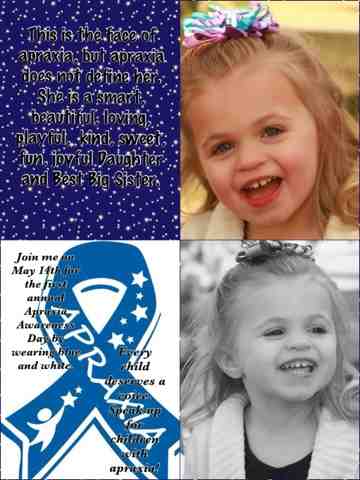First annual Apraxia Awareness Day! What it means to me as a mom and SLP
I never thought when I was going through school to be a speech/language pathologist, or when I became a speech/language pathologist, that I would one day have a child who would have apraxia. It’s funny, because before I had Ashlynn, I was still drawn to the disorder. I was highly disappointed about the information that was available on it in graduate school. I think I have a packet of maybe 20 papers that discusses Childhood Apraxia of Speech (CAS), and that’s it. Luckily, I had an amazing mentor who was able to take me to a conference given by Ruth Stoeckel from the Mayo Clinic in 2005. I still have her packet today, and have shared the knowledge I gained there with many colleagues.
In 2008, I had a child enter my school and on my caseload when he was in Kindergarten. He did have an IEP from Early Intervention; however, therapy had been primarily unsuccessful. One day, he pulled out an alphabet BINGO game I had on my shelf. He proceeded to say every letter sound in isolation. I quickly realized he must have Childhood Apraxia of Speech (CAS)! Apraxia is a motor planning disorder that affects a child’s ability to accurately plan, sequence, and execute the sounds needed for intelligible speech. Since he could say all the sounds in isolation, it was clear to me the breakdown must have been in the sequencing. I pulled out my packet from Ruth, and searched for resources.
Fortunately by the end of the school year, he was talking in sentences! That’s the power of information. That’s the power of awareness. That’s the power I hope other SLP’s who may only have a 20 page packet from grad school get when they are called attention to Apraxia Awareness Day.
I am so grateful that there is now an Apraxia Awareness Day, not only for the children affected by CAS and their families, but also for the professionals who treat it. We all know that early identification is key, but many kids can be identified much sooner than they are! I currently am in another school building, in almost the exact same situation. I have a child from a bilingual home come into Kindergarten nonverbal. Now that I have more experience, now that I’m armed with more information and more tools, we started making progress the first week. Though I’m happy for his progress, I am sorry for it’s tardiness. Especially, for his sake. He is so smart. He can point to any sight word in English AND Spanish, but just can’t put those sounds together coherently. He’s frustrated and embarrassed. This shouldn’t have to happen to any more kids, and this is what Apraxia Awareness I hope, will accomplish.
As for my daughter? I could never have fully appreciated the disorder outside the disorder, if it wasn’t for her. In her I see it’s humanity and complexity, it’s heartbreak and hope, it’s tenacity and victory! My 3 year old daughter has taught me more about CAS then graduate school, then professional developments, or my professional experience. I can only believe that God chose me to be an SLP for a reason, and that my daughter has CAS for a reason. I don’t want to disappoint Him, and I don’t want to disappoint her; so I stand up for all the kids who DESERVE a voice to raise awareness on this first ever Apraxia Awareness Day!
